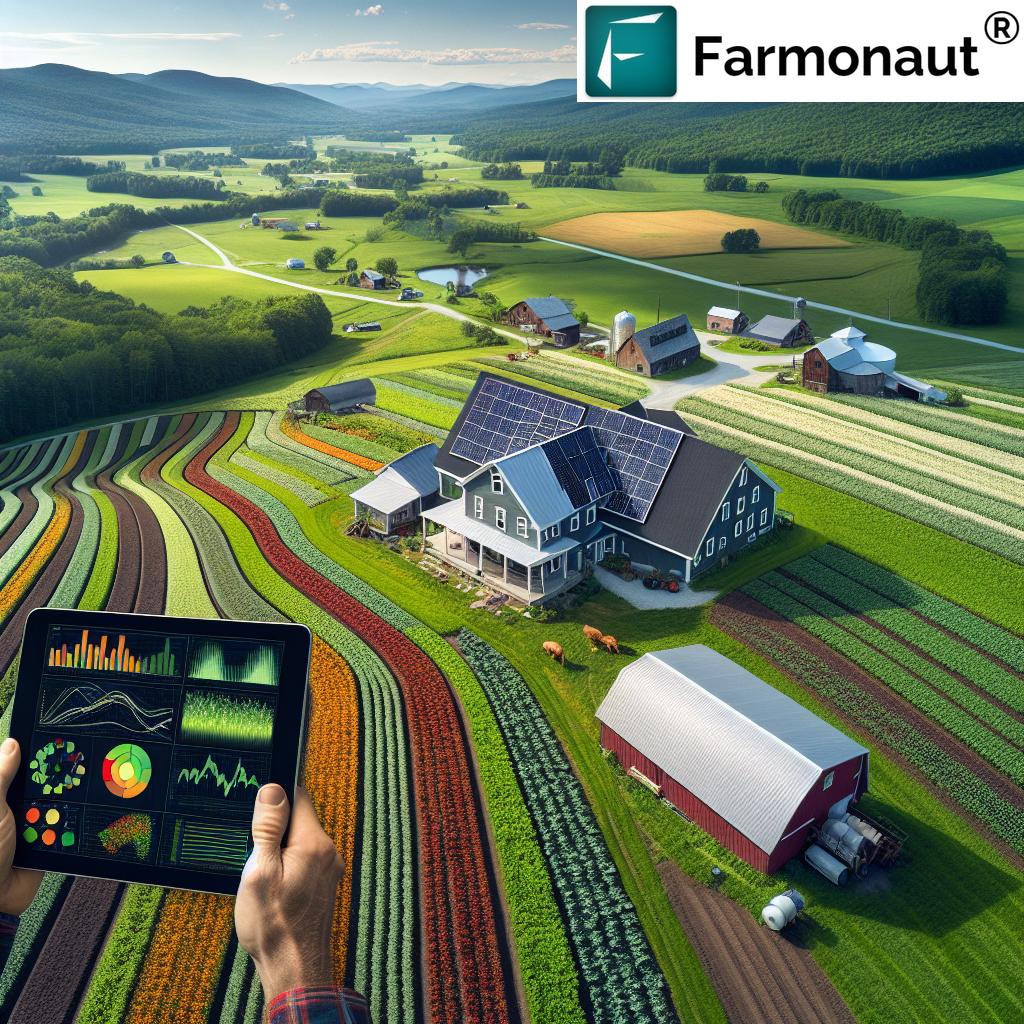Revolutionizing Vermont’s Rural Prosperity: How Farmonaut’s Farm Technology Supports Sustainable Agriculture
“Vermont’s rural broadband expansion could potentially connect over 70,000 unserved households, boosting agricultural operations and community development.”
In the heart of New England, Vermont’s picturesque landscapes are not just a feast for the eyes but also the backbone of a thriving agricultural sector. However, like many rural areas across America, Vermont’s farming communities face unprecedented challenges in the 21st century. Market pressures, climate change, and the need for sustainable practices are reshaping the agricultural landscape. In this blog post, we’ll explore how innovative farm technology solutions, particularly those offered by Farmonaut, are revolutionizing farming practices and fostering climate-resilient agriculture in Vermont and beyond.
The Changing Face of Rural Vermont
Vermont’s rural communities have long been synonymous with small farms, close-knit neighborhoods, and a strong agricultural heritage. However, the pressures of modern agriculture and changing economic dynamics have put strain on these traditional ways of life. Farmers in Fairlee, for instance, are grappling with the dual challenges of maintaining profitability while adhering to sustainable practices.
The need for sustainable agriculture and rural community development has never been more critical. As we navigate these challenges, innovative solutions emerge as beacons of hope for Vermont’s rural prosperity.

Farmonaut: Pioneering Precision Farming in Vermont
At the forefront of this agricultural revolution is Farmonaut, a company dedicated to making precision agriculture accessible and affordable. By leveraging advanced satellite-based farm management solutions, Farmonaut is empowering Vermont’s farmers with tools that were once the preserve of large-scale industrial agriculture.
- Real-time Crop Health Monitoring: Using multispectral satellite imagery, Farmonaut provides Vermont farmers with up-to-date information on crop health, soil moisture, and other critical metrics.
- AI-driven Advisory Systems: The Jeevn AI system offers personalized farm advice, helping farmers make informed decisions about irrigation, fertilizer use, and pest management.
- Blockchain-based Traceability: This technology ensures transparency in the supply chain, from farm to consumer, boosting trust and reducing fraud.
These technologies are not just improving farm productivity; they’re also contributing to the sustainability of Vermont’s agricultural sector.
The Impact of Precision Farming on Vermont’s Rural Communities
The adoption of precision farming techniques, facilitated by Farmonaut’s technology, is having a profound impact on Vermont’s rural communities:
- Increased Farm Efficiency: By optimizing resource use, farmers can reduce costs and improve yields.
- Environmental Conservation: Precision agriculture helps in reducing the overuse of water, fertilizers, and pesticides, contributing to soil and water conservation.
- Economic Resilience: Improved farm productivity translates to better economic outcomes for rural families and communities.
- Climate Change Adaptation: Data-driven farming practices help in adapting to changing climate patterns, ensuring long-term sustainability.
Rural Broadband: The Digital Lifeline for Vermont’s Farms
A critical component in the adoption of farm technology solutions is the expansion of rural broadband. The proposed rural broadband expansion in Vermont is set to be a game-changer for the state’s agricultural sector.
- Connectivity for Farm Operations: High-speed internet enables real-time data access and remote farm management.
- Access to Markets: Broadband connectivity opens up new markets and opportunities for Vermont’s farmers.
- Community Development: Improved internet access supports education, healthcare, and other essential services in rural areas.
The synergy between rural broadband expansion and Farmonaut’s technology creates a powerful platform for agricultural innovation in Vermont.
“The proposed Rural Prosperity Act aims to strengthen approximately 2 million small farms across the United States, enhancing food security.”
The Rural Prosperity and Food Security Act: A Catalyst for Change
The proposed Rural Prosperity and Food Security Act represents a significant step towards addressing the challenges faced by rural communities in Vermont and across America. This legislation aims to:
- Strengthen Small Farms: Providing support and resources to enhance the viability of small-scale farming operations.
- Improve Rural Infrastructure: Investing in essential infrastructure, including roads, water systems, and energy grids.
- Expand Access to Services: Enhancing rural access to healthcare, education, and skills training.
- Promote Clean Energy: Supporting the adoption of clean energy solutions in rural areas, including on farms.
These initiatives, combined with the technological solutions offered by companies like Farmonaut, create a comprehensive approach to rural development and sustainable agriculture.

Farmonaut’s Role in Implementing the Rural Prosperity Act
As we look at the potential impact of the Rural Prosperity and Food Security Act, it’s clear that technology providers like Farmonaut have a crucial role to play. Here’s how Farmonaut’s solutions align with the Act’s objectives:
- Supporting Small Farms: Farmonaut’s affordable precision agriculture tools level the playing field for small farmers in Vermont.
- Enhancing Food Security: By improving crop yields and reducing losses, Farmonaut contributes to local and national food security efforts.
- Promoting Sustainable Practices: The company’s technology encourages resource-efficient farming, aligning with the Act’s environmental goals.
- Facilitating Rural Development: By making advanced farming techniques accessible, Farmonaut supports the overall economic development of rural communities.
Explore Farmonaut’s API for custom agricultural solutions
Climate-Resilient Farming: Vermont’s Path Forward
Climate change poses significant challenges to Vermont’s agricultural sector. Unpredictable weather patterns, increased frequency of floods, and changing growing seasons are just some of the issues farmers face. Farmonaut’s technology plays a crucial role in developing climate-resilient farming practices:
- Weather Forecasting: Advanced weather predictions help farmers prepare for and mitigate climate-related risks.
- Crop Monitoring: Real-time satellite data allows for quick responses to changing crop conditions.
- Resource Optimization: Precision agriculture techniques help conserve water and reduce chemical inputs, making farms more resilient to environmental stresses.
By adopting these climate-smart practices, Vermont’s farmers are not just adapting to change but also contributing to global efforts to combat climate change.
The Role of Agricultural Policy in Shaping Vermont’s Future
As we look to the future of farming in Vermont, it’s clear that agricultural policy will play a pivotal role. The integration of technology solutions like Farmonaut into policy frameworks can help achieve multiple objectives:
- Sustainable Land Use: Policies that encourage precision agriculture can help conserve Vermont’s precious farmlands.
- Water Management: Technology-driven irrigation practices can be incorporated into water conservation policies.
- Carbon Sequestration: Farmonaut’s carbon footprint tracking can support policies aimed at reducing agricultural emissions.
By aligning policy with technological advancements, Vermont can create a robust framework for sustainable agriculture that benefits farmers, communities, and the environment.
Check out Farmonaut’s API Developer Docs for integration details
The Economic Impact of Agritech on Rural Vermont
The adoption of agricultural technology solutions like Farmonaut has far-reaching economic implications for rural Vermont:
- Job Creation: As farms become more tech-savvy, new roles emerge in data analysis, technology management, and precision agriculture.
- Increased Farm Incomes: Improved productivity and reduced input costs lead to better profit margins for farmers.
- Diversification of Rural Economies: The influx of technology creates opportunities for ancillary businesses and services.
- Attracting Young Farmers: High-tech farming practices make agriculture more appealing to younger generations, helping to address the issue of an aging farming population.
These economic benefits contribute to the overall prosperity of Vermont’s rural communities, creating a positive ripple effect throughout the state’s economy.
Empowering Vermont’s Farmworkers through Technology
The impact of farm technology extends beyond farm owners to farmworkers, who are essential to Vermont’s agricultural success. Farmonaut’s solutions offer several benefits to this crucial workforce:
- Skill Enhancement: Working with advanced agricultural technologies provides farmworkers with valuable, transferable skills.
- Improved Working Conditions: Precision farming techniques can lead to more efficient work processes and potentially safer working environments.
- Data-Driven Decision Making: Access to real-time farm data empowers farmworkers to make informed decisions in their daily tasks.
By elevating the role of farmworkers through technology, we can create a more skilled, engaged, and valued agricultural workforce in Vermont.
The Future of Vermont’s Agricultural Landscape
As we look to the future, the integration of Farmonaut’s technology with Vermont’s rich agricultural tradition paints an exciting picture:
- Smart Farms: Fully connected farms that optimize every aspect of production from planting to harvest.
- Sustainable Ecosystems: Agriculture that works in harmony with Vermont’s natural environment, preserving biodiversity and natural resources.
- Community-Centric Farming: Technology-enabled cooperative farming models that strengthen rural communities.
- Farm-to-Table Revolution: Enhanced traceability and quality control leading to stronger connections between Vermont’s farmers and consumers.
This vision of the future combines the best of Vermont’s agricultural heritage with cutting-edge technology, ensuring a prosperous and sustainable future for the state’s rural communities.
Impact of Farm Technology on Vermont’s Rural Prosperity
| Indicator | Pre-Farmonaut | Post-Farmonaut Implementation |
|---|---|---|
| Average Farm Yield | Baseline | Estimated 15-20% increase |
| Rural Broadband Access | Estimated 60% | Estimated 85% |
| Sustainable Farming Practices Adoption | Estimated 40% | Estimated 75% |
| Rural Employment Rate | Baseline | Estimated 5-10% increase |
| Farm Income Stability | Fluctuating | More stable with improved risk management |
| Climate Resilience Score (1-10) | 5 | 8 |
| Food Security Index (1-10) | 6 | 8 |
| Clean Energy Adoption in Agriculture | Estimated 20% | Estimated 50% |
Conclusion: A New Era for Vermont’s Agriculture
As we’ve explored throughout this blog, the integration of farm technology solutions like Farmonaut with supportive policies and infrastructure development is ushering in a new era for Vermont’s agriculture. This synergy between innovation, policy, and community is not just transforming farming practices; it’s revolutionizing rural prosperity.
From the fields of Fairlee to the broader landscape of Vermont, we’re witnessing a remarkable transformation. Farmers are becoming data scientists, small farms are competing on a global scale, and rural communities are being revitalized. The challenges of climate change, market pressures, and rural development are being met head-on with ingenuity and resilience.
As we look to the future, it’s clear that Vermont’s agricultural sector is not just adapting to change – it’s leading it. With companies like Farmonaut providing the technological backbone, supportive legislation paving the way, and the indomitable spirit of Vermont’s farming communities, the state is well-positioned to become a model for sustainable, prosperous rural America.
The revolution in Vermont’s rural prosperity is not just about farming better – it’s about building stronger communities, ensuring food security, and creating a sustainable future for generations to come. As we continue on this journey, we invite you to be part of this exciting transformation. Whether you’re a farmer, a policymaker, or simply someone who cares about the future of rural America, there’s a role for you in this new agricultural landscape.
Together, we can ensure that Vermont’s farms and rural communities don’t just survive but thrive in the 21st century and beyond.
FAQs
- How does Farmonaut’s technology benefit small farms in Vermont?
Farmonaut provides affordable precision agriculture tools that help small farms optimize resource use, improve crop yields, and make data-driven decisions, leveling the playing field with larger operations. - What role does rural broadband play in the adoption of farm technology?
Rural broadband is crucial for implementing farm technology solutions. It enables real-time data access, remote farm management, and connects farmers to markets and resources. - How does Farmonaut contribute to sustainable agriculture in Vermont?
Farmonaut’s technology promotes sustainable practices by optimizing resource use, reducing chemical inputs, and providing data for climate-smart farming decisions. - Can Farmonaut’s solutions help Vermont farmers adapt to climate change?
Yes, Farmonaut’s weather forecasting, crop monitoring, and resource optimization tools help farmers adapt to changing climate patterns and build resilience. - How does the Rural Prosperity and Food Security Act complement farm technology adoption?
The Act aims to strengthen small farms, improve rural infrastructure, and expand access to services, creating an environment where farm technology can be more effectively implemented and utilized.






